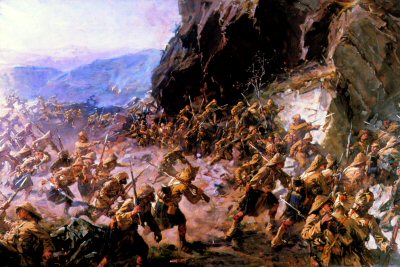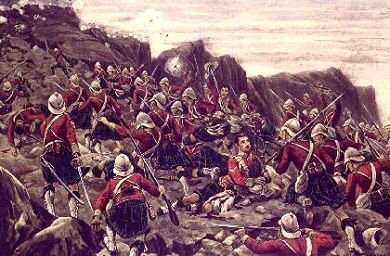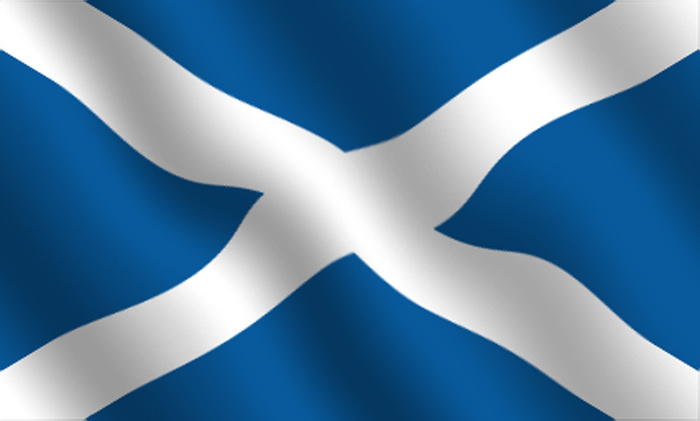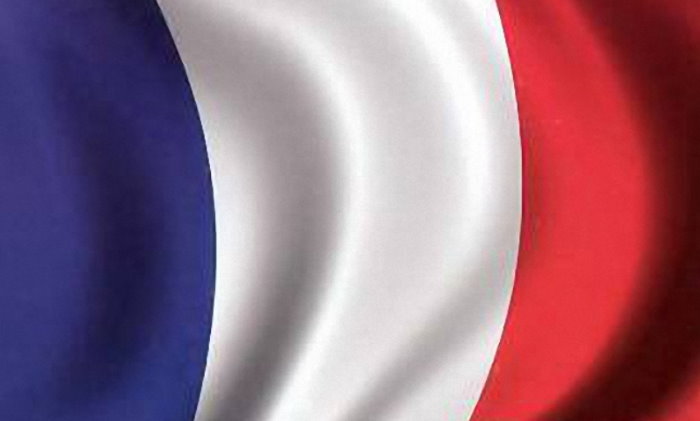This tune composed by J. Wallace, commemorates the bravery of the Gordon Highlanders regiment at the battle of the Heights (cliffs) of Dargai (a promontory in India) in 1897.
In the late nineteenth century, Russia and United-Kingdom competed to strengthen their hegemony over Pakistan. The Russians wanted to open the way to the South-East Asia and the British to protect the jewel of their colonial empire: India. It is within this context that United-Kingdom decided to ensure its communication channels in the inhospitable regions of Northwest India sending troops to stop the incessant incursions by rebel tribes on the warpath.
Thus began the 1897 Tirah campaign. A force of 32,882 officers and troops supported by a service of supplies and medical needs of 19,558 men, 8,000 horses, 18,384 mules (not including camels and carts) was fielded. Among them was the Gordon Highlanders regiment.


|
In October 1897 the British army tried to quell the rebellion of one of the main tribes: the Afridi. On October 18 it began to attack the cliffs of Dargai. This 300 yards high rocky outcrop eroded, a true natural bulwark occupied by 8000 Afridis, was a highly strategic point, commanding the entrance of a pass. Its control was vital to commercial and military communications. Cliffs, taken, were again lost after an Afridis counter-attack. On October 20 the Dorset and Devon regiment and the Ghurka Rifles attacked again. Their attack failed and the Gordons Highlanders received the order to get into the fray. Their colonel, Mathias said: "This cliff must be conquered at any cost ... The Gordon Highlanders will succeed." At the sound of bagpipes, they climbed the cliffs under heavy fire, totally discovered on the first 150 meters. The piper Findlater (*), hit by bullets in both hips, is helped by his companions who leaned him against a rock. He continued to play bagpipes guided his regiment forward.
| The Afridis amazed by the bravery of the Highlanders began to ebb in disorder and in 40 minutes the regiment of Scottish Highlanders seized the cliffs. There is controversy about the bagpipe tune played during the battle. For many it was "Cock O’ the North" the Gordon Highlanders regiment’s march. Findlater himself not remembered what he played, suggesting that it might be "Haughs (Lowlands) of Cromdale" more appropriate to train soldiers to the front. |

|
|
As a result of his leg injuries Findlater was unfit for further service, but such was his celebrity after his decoration that he was able to command considerable fees by playing his pipes in popular music halls.
| 
|
Not everyone approved of Piper Findlater taking advantage of his fame and he was criticised
for not accepting the offer of a job at Balmoral piping for the Queen.
He received £25 per week appearing at the Alhambra and had been offered 18 shillings (90 pence)
per week to work on the Balmoral estate.
Piper Findlater had no ambition for a professional theatrical career.
He saw his performances as a short-term opportunity and wrote that, “my intentions are,
if I can manage during the next twelve months to earn sufficient, to rent and stock a farm
somewhere in my native county, then my ambition will be fully satisfied.”
When war broke out in 1914 George Findlater was a 42-year-old farmer. Findlater volunteered for the 9th Battalion of The Gordon Highlanders. He travelled to France with the battalion in July 1915 as a Sergeant Piper and was wounded at Loos. Invalided out of the army he returned to Aberdeenshire to his farm. Between 1919 and 1939 Findlater act as the Pipe Major of the Turriff Pipe Band. On 4 March 1942 George Frederick Findlater, VC, the Piper of Dargai, died of a heart attack aged 70 years. His decoration of the Victoria Cross is displayed at the Gordon Highlanders Museum in Aberdeen.
From Edmund L. Hill, 1913, "Poems,"

The Gordon Highlanders will take the crest, Our Colonel cried, and an answering cheer Swept from rank to rank as we lay at rest, And the Colonel smiled to hear. Then up we charged at the steep hillside, And never a heart but beat with pride, Though every minute a soldier died, As we stormed the pass at Dargai. Far above on the fire-swept hill we saw, Scattered here and there, the brave Warwick’s dead, And behind we heard a battery roar As the shells screamed overhead. And all around us the bullets struck; And at first I tell you I tried to duck, But there wasn’t time, so I prayed for luck, As we stormed the pass at Dargai. Then as we got neared the rock-bound top; The shrapnel before us no longer burst, But never a man of us wished to stop, Though choking and maddened with thirst. For our bagpipes played us up the hill, And through the din rose their music shrill That filled our hearts with mad lust to kill, As we stormed the heights at Dargai. Then all of a sudden the music stopped As a volley burst from the rocks ahead, For the piper near me spun round and dropped And I thought that he was dead. For he lay stretched out upon the ground, But I hadn’t fired another round Ere I heard once more the brave old sound, As we stormed the pass at Dargai. Then I turned to look and I saw him lie, Hard wounded but playing for all he knew; And the rear ranks cheered as they hurried by, While the bullets round them flew. And every man of us yelled with pride, And dashed like one at the steep hillside, Where every second a foeman died, For we stormed the pass at Dargai. When proudly our flag waved overhear, Telling those below we had won the day, We went to look for our wounded and dead, Thick strewn on our upward way. We searched all round for our piper, till We found him fainting upon the hill, And his weak hands grasped the bagpipes still, That had piped us on to Dargai. |

« Le Gordon Highlanders enlèvera la crête », Cria notre colonel. Nous lui répondîmes par des acclamations Majestueusement sorties rang après rang alors au repos, Et le colonel sourit de nous entendre. Ensuite, nous avons chargé jusqu’aux falaises escarpées, Jamais nos cœurs n’auront battu avec tant de fierté, Malgré nos lourdes pertes, Nous avons pris d’assaut le col de Dargai. Loin au-dessus de la colline balayée par le feu, nous avons vu, Dispersés ici et là, les cadavres des braves de Warwick, Et derrière, nous avons entendu le grondement des canons Puis les obus siffler au dessus de nos têtes. Tout autour de nous les balles frappaient, Nous eûmes le réflexe de nous cacher, Mais ce n’était pas le moment aussi nous avons prié dame chance, Et pris d’assaut le col de Dargai. Lorsque nous approchâmes du sommet ; L’artillerie suspendit son tir de couverture, Mais aucun de nous ne s’arrêta, Bien que suffoquant et tourmenté par la soif. Au milieu du vacarme, la mélodie stridente de nos cornemuses, Accompagna notre ascension Remplissant nos cœurs du désir de vaincre, Nous avons pris d’assaut les hauteurs de Dargai. Soudain la musique se tût Lorsque des tirs venus des rochers nous surplombant, Firent mordre la poussière à notre sonneur Que je crus mort Car il était étendu sur le sol. Mais avant même que je n’ouvre à nouveau le feu J’entendis à nouveau le courageux sonneur jouer, Et nous prîmes d’assaut le col de Dargai. Je me suis retourné et je l’ai vu allongé, Sérieusement touché mais continuant de jouer; Et l’arrière garde l’acclama tout en se précipitant, Alors que les balles pleuvaient autour d’elle. Et chacun d’entre-nous cria avec fierté, Et se jeta d’un seul homme sur le flanc de la colline, Où l’ennemi succomba en nombre, Lorsque nous prîmes d’assaut le col de Dargai. Lorsque notre drapeau flotta fièrement au sommet, Prévenant ceux des nôtres en bas de notre victoire, Nous sommes allés ramasser nos blessés et nos morts, Jonchant le chemin du col. Nous cherchâmes partout alentours notre sonneur, jusqu’à Nous le retrouvâmes évanoui sur la colline, Ses mains faibles toujours fermement agrippées à sa cornemuse, Qui nous mena à Dargai. |
|
Simon Fraser University
|

